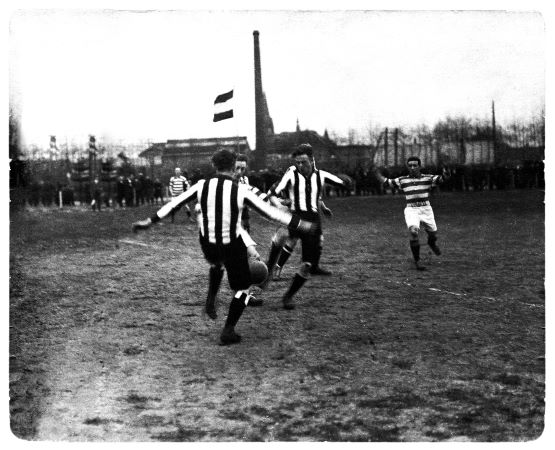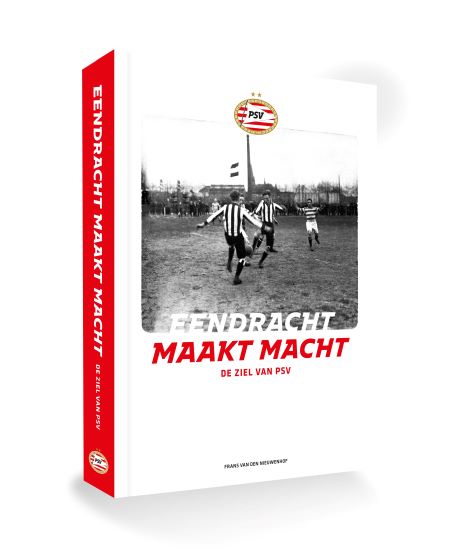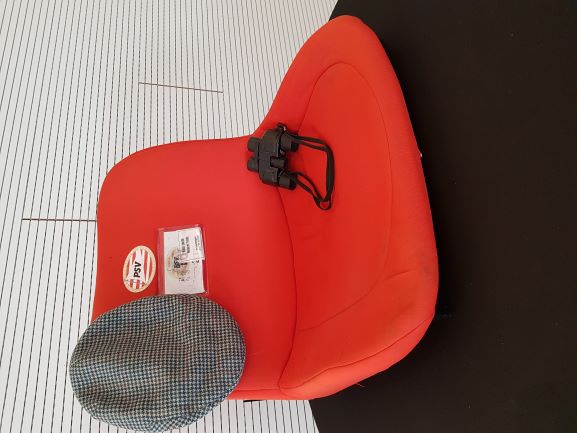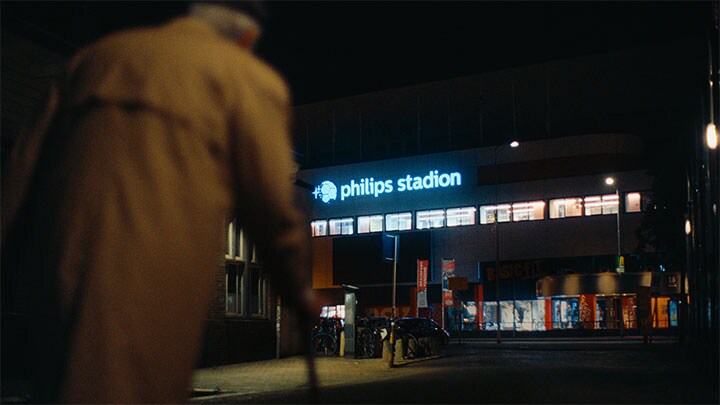Philips and PSV longest running sponsorship in the world
Philips and PSV capture an official world record with the longest running sponsorship in sports. This new world record will be announced by Philips and PSV the day after the soccer club's 110th anniversary. The record will be officially sanctioned by an entry in the Guinness Book of Records.
110 years of cooperation
The partnership between Philips and PSV exists for exactly 110 years on August 31, 2023, this is unique in the world. Since the establishment of the Philips Sports Association in 1913, the club and the health technology company Philips have been inextricably linked. As 'founder' of PSV, Philips played an important role in the development of the club. Today, Philips and PSV work closely together on new innovations to strengthen PSV's top sports climate. The knowledge and solutions of the health technology company are used for research in the field of soccer cognition and muscle strength, among others. In addition, Philips is one of the driving forces behind the PSV Brainport partnership and namesake of the Philips Stadion.
Official recognition in Guinness Book of World Records
On PSV's birthday, Philips and the club set a world record. This valuable partnership receives official recognition as "Longest time to sponsor a sports team" in the Guinness Book of World Records. The previous record was held by Ford Motor Company and Australia's Geelong Football Club with 98 years.

Exhibition 'Unity is strength'
At the Philips Museum in Eindhoven, visitors can witness the temporary exhibition 'Unity is Strength' until the end of 2023. The exhibition celebrates the more than a century-old relationship between PSV, Philips and the city of Eindhoven. In this way the soccer pride of Eindhoven symbolizes the development into the metropolitan region Brainport Eindhoven. The story of PSV, Philips and the city is told in the exhibition through its most prominent eyewitness: Frits Philips. He kicked off the first match of the Philips Elftal (the forerunner of PSV) in 1911 as a 5-year-old boy and remained a fan of the soccer club until his death in 2005. He saw the city of Eindhoven grow and was closely involved with the Philips group, including 10 years as president.
‘PSV, Philips and Eindhoven: unity really is strength!'’
The exhibition is based on the book of the same name (Eendracht maakt Macht, de ziel van PSV) by journalist and PSV historian Frans van den Nieuwenhof. We spoke to him, and curator Sergio Derks, about the book, the expo and the DNA of Philips, which still flows through the veins of the club and the city.

Frans, how did you come up with the idea for the book?
Frans: 'I have written historical books about PSV before, but during a presentation on the significance of Brainport for PSV it really dawned on me: what is happening now within the region, both socially and economically, is a blueprint of history. Current core values such as cooperation and connection were already blossoming a hundred years ago, when Philips was starting to grow and PSV was in its infancy. In the book, which mainly covers the period between 1910 and 1928, I make the link between the core values of then and the present. While I was writing, Philips Company Archives advised me to set up an exhibition together with the museum. That's how the ball got rolling.'

How did the bond between Philips and PSV originate?
Frans: 'That connection goes back to 1910, when Philips founded its own soccer club to offer new employees some form of leisure. Philips needed people for the light bulb factory and many of those employees came from outside and wanted to do something other than sit in church on Sundays. The Philips Elftal collapsed under the struggles, but in 1913, during the independence celebrations, the Philips Sports Association was founded. Sergio: 'The medal has two sides of course, and the same is true for that association. Philips wanted to take good care of its employees, but in those days there was very little entertainment. Sport gave you something to do after work and kept you healthy. By encouraging sports, the company ensured healthy employees. Anton Philips, himself a great sports fan, encouraged sports. Both the company and the employees themselves benefited.
So Philips invested heavily in its employees?
Sergio: 'Yes, Philips was already offering employees good social conditions back then. This was illustrated by facilitating sports and healthcare, but also by the introduction of the Philips Village. Those houses, which still exist around the Philips Stadium today, were state-of-the-art at the time. You have to imagine that most people did not yet have running water and dumped their feces in a cesspool. These houses had faucets and sewers; people didn't know what hit them. Philips also provided all kinds of amenities in the city, such as a recreation center, schools and an outpatient clinic. And the Sports Park, of course, built right in the middle of Philips Village. Many of these facilities were decisive for the growth of Philips, PSV and the city of Eindhoven.'
How did the development of Eindhoven continue?
Frans: 'Philips not only invested in facilities, but also enabled the annexation of Eindhoven with surrounding villages. Those new workers needed housing, of course, so they exerted strong pressure to bring villages together. Then Philips became a global concern and PSV grew into a top international club. All current developments with Brainport have their origins in that period; that's where the soul of the region was born. It is the combination of top sport, health, technology and innovation that connects us.'
How are the core values of the past reflected in the present?
Frans: 'Frits Philips' son explained it nicely. He said that people have always been central to Philips. There was more to it than just making a profit; as a company you had to be socially involved and take good care of your people. You can see that basis in today's Brainport. It is more than an economic magnet; a lot is also happening socially to attract and retain new talent. And the connection between the various companies in the Brainport region is also nothing new. Right after the Second World War, Frits Philips founded the Eindhoven Manufacturers Circle to stimulate mutual cooperation. Brainport could be seen as a natural offshoot of such initiatives.
Sergio, how is all of this reflected in the exhibition?
Sergio: "In the exhibition we want to give a picture of the early years and the interconnectedness. ... And who better to do that than Frits Philips? He kicked off the first match of the Philips Elftal as a five-year-old boy and was closely involved with PSV, Philips and the city until his death in 2005. He is our star witness that runs like a thread through the exhibition. PSV allowed us to borrow his chair on which he sat in the stadium, his cap and binoculars. Also the images of the moment when Mark van Bommel brought the championship trophy to him in the stands will certainly return, along with unique photos from the archives of the Philips family, PSV and Philips. Furthermore, we show some of PSV's successes, but of course not as extensive as in the PSV Museum. For example, we have a hologram of the European Cup - where visitors can make a nice selfie. That hologram symbolizes the connection between innovation and technology on the one hand and that great sporting achievement on the other. Now just hope Theo Maassen doesn't drop by and take it with him!'
In conclusion: Suppose you don't like soccer, why would you go to this exhibition anyway?
Frans: 'As a visitor you not only discover the soul of PSV, but also the strong connection with the company and the city. How that has always been inextricably linked. Brainport is nothing new, we always have been. It's in our DNA and it leads us into the future. You get to know and understand the triangle better, it goes a lot further than just soccer.' Sergio: 'We hope it will allow us to attract a wider audience to the museum, such as soccer fans who want to discover the roots of their club. It remains an interesting history how the company, the club and the city have grown so much together. Unity really strengthens, as it turns out.' *Interview with Frans van den Nieuwenhof and Sergio Derks was written
at the time of the mid-June 2020 exhibition opening.
More news about the world record: Read Philips' official news release about the announcement of the
official world record here: www.philips.nl/psv
And order the book on PSV here: Philips Museum Shop


